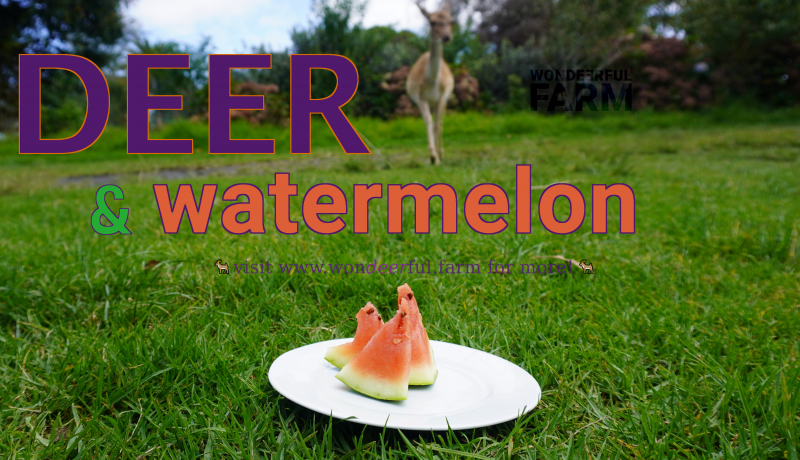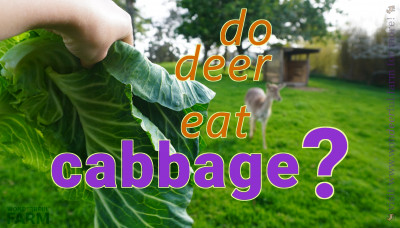Do Deer Eat Watermelon?
» Deer stories » Do deer eat » Do Deer Eat Watermelon?Deer do eat watermelon because it is both delectable and has a wealth of nutrients that can support their well-being and promote their growth. Yes, the whole thing: the fruits, leaves, stems, and vines of watermelon are appealing to deer.
Without further adieu, we present to you one of our deer enjoying some watermelon in the following video.
Will Deer Eat Whole Watermelon with Rinds?
As you've just witnessed, deer have nothing against the rinds, they're happy to crunch them down together with the rest of the fruit, if the slices are compact enough to handle. If we're talking deer attacking the watermelon patch though, the shell of the fruit is often in pieces too big to bother chewing, especially since they might as well go after the the juicy, sweet flesh within.
They will use their sharp hooves to puncture the watermelon and crack it open.
Naturally, this can be problematic for farmers as it can cause significant damage to the harvest and attract other pests to the watermelon patch, resulting in a loss of crops.
Is Eating Watermelon Good for Deer?
Watermelon is a nutrient-dense fruit that contains a variety of essential vitamins and minerals that are beneficial to both humans and animals alike. Some of the key nutrients found in watermelon include:
- Vitamin C: An antioxidant that supports the immune system and aids in the absorption of iron.
- Vitamin A: Helps maintain healthy skin, vision, and immune function.
- Potassium: An electrolyte that is essential for maintaining proper hydration, nerve and muscle function, and heart health.
- Magnesium: Helps regulate blood pressure, support bone health, and promote healthy digestion.
- Lycopene: An antioxidant that is responsible for the fruit's red color and has been linked to reducing the risk of certain types of cancer.
In addition to these nutrients, watermelon, like cucumber, is also a good source of hydration, as it is composed of about 92% water. This makes it an ideal snack for deer and other animals living in hot and dry environments.

Deer thrive on consuming variety of foods, but they need to get used to things over time. Many fruits and vegetables are perfectly safe and beneficial to deer, things like apples, bananas, carrots, sweet potatoes etc, provided they're consumed in moderation and animals had time to adjust to eating them.
Will Watermelon Plant Recover if Eaten by Deer?
It is important to safeguard the young shoots of watermelon plants from being consumed by deer since they are not as resilient at this stage. If they are eaten early in their development, it can have a detrimental effect on their growth.
Mature plants, on the other hand, can withstand some amount of damage from deer and may recover, although their growth may be stunted.

Image by Cheryl Zelenka Pixabay
How can I protect my watermelon patch?
We have listed a number of methods for protecting your garden from deer, anything from scent repellents to motion activated devices. You can also try making it unpleasant for the deer to reach the watermelon patch with hedges made of repelling shrubs like rosemary. Still, nothing beats a solid fence. Check out the article and make some notes.
What animals naturally eat watermelons?
Watermelon is a popular fruit among many animals in addition to deer. Some of the common animals that eat watermelon include raccoons, squirrels, birds, and insects like bees and butterflies.
Conclusion
Deer are known to be a common nuisance in gardens and farms, and watermelon plants are no exception. While watermelons may not typically be at the top of the list of foods that deer target, they are certainly not immune to deer damage. As mentioned earlier, deer can consume both the fruit and rind of the watermelon, which can cause significant harm to a crop.
To prevent deer from accessing your watermelon plants, one option is to install a sturdy fence that will prevent them from reaching the plants. However, it is essential to ensure that the fence is high enough, as deer can easily jump over shorter fences. Another option is to use plants that deer do not like, such as lavender or rosemary, to create a thick barrier around the watermelon patch.
While neither of these methods is foolproof, they can help to reduce the likelihood of deer damage to your watermelon crop. By taking these preventative measures, you can increase your chances of harvesting a bountiful crop of sweet and juicy watermelons.
Last modified 2023-09-05 at 10:57
Published 15 March 2023
Add your comment
More «Do deer eat» stories
Do Deer Eat Cabbage?
This post addresses the questions of both gardeners and those keen on feeding their local deer. Do deer enjoy cabbage and is it healthy for them to eat. How to protect cabbage crops from deer in your garden.
read more...
 '
'
